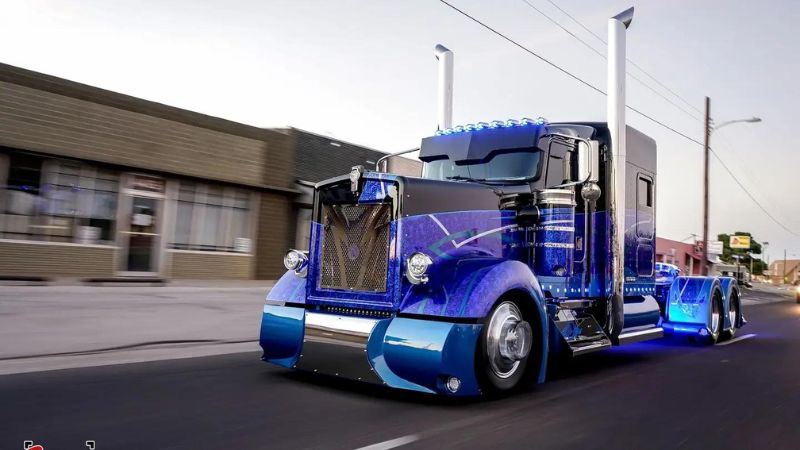The trucking industry presents unique financial challenges for truck drivers, especially those spending extended periods away from home. To address these challenges, it’s crucial for truck drivers to adopt smart money-saving strategies. This blog post explores five practical and effective tips tailored specifically for truck drivers to save money. From minimizing expenses at truck stops to establishing a budget and leveraging cost-saving meal options, these tips are designed to help truck drivers optimize their finances and make the most of their earnings while on the road.
Money saving Tips for Truck Drivers
“Tips for Truck Drivers to Save Money” offers practical advice on minimizing expenses and maximizing efficiency in the transportation industry. From planning efficient routes to adopting fuel-efficient driving habits, these tips help drivers reduce fuel consumption, lower maintenance costs, and improve overall profitability. By implementing these strategies, truck drivers can achieve financial savings while enhancing operational performance on the road.
Plan Efficient Routes

Planning efficient routes involves using technology and strategic thinking to minimize fuel consumption and maximize productivity. With the help of GPS technology and route planning software, truck drivers can analyze various factors such as traffic patterns, road conditions, and elevation changes to determine the most optimal route for each trip. By selecting routes with fewer miles and less traffic congestion, drivers can reduce fuel expenses and save valuable time on the road. Moreover, planning efficient routes allows drivers to anticipate potential obstacles and make necessary adjustments, ensuring timely deliveries and customer satisfaction. Overall, investing time in route planning pays off by improving fuel efficiency, increasing profitability, and enhancing overall operational efficiency.
Read More: 9 Strategies For Eco-Friendly Trucking Should Know
Maintain Proper Tire Pressure
Maintaining proper tire pressure is a crucial aspect of truck maintenance that directly impacts fuel efficiency and overall performance. When tires aren’t filled properly, they create more rolling resistance, which makes the engine work harder and use more fuel. Regularly checking tire pressure using a reliable gauge and inflating them to the manufacturer’s recommended levels is essential for optimizing fuel efficiency. Additionally, properly inflated tires promote even tread wear and reduce the risk of blowouts, enhancing safety on the road. By investing in routine tire maintenance and inspections, truck drivers can not only save money on fuel but also extend the lifespan of their tires, ultimately reducing long-term operational costs and enhancing overall vehicle reliability.
Practice Fuel-Efficient Driving Habits

Practicing fuel-efficient driving habits is an effective way for truck drivers to minimize fuel consumption and maximize savings. Avoiding aggressive driving behaviors such as rapid acceleration, excessive speeding, and hard braking can significantly improve fuel efficiency. Instead, drivers should focus on maintaining a steady speed, utilizing cruise control on highways, and anticipating traffic flow to minimize unnecessary stops and starts. Additionally, reducing idle time and avoiding unnecessary engine idling can further conserve fuel and reduce emissions. By incorporating fuel-efficient driving techniques into their daily routines, truck drivers can not only save money on fuel expenses but also reduce vehicle wear and tear, leading to lower maintenance costs and improved overall profitability.
Minimize Idle Time
Minimizing idle time is an effective strategy for reducing fuel consumption and minimizing environmental impact. Excessive engine idling wastes fuel and contributes to unnecessary emissions, negatively impacting both operational costs and air quality. To minimize idle time, truck drivers can turn off their engines during extended stops or breaks and utilize auxiliary power units (APUs) or bunk heaters for heating, cooling, and electrical power needs. By implementing idle reduction strategies, drivers can not only save money on fuel but also extend the lifespan of their engines and reduce their carbon footprint. Additionally, minimizing idle time contributes to a quieter and healthier environment for both truck drivers and surrounding communities, demonstrating a commitment to sustainability and responsible vehicle operation.
Invest in Fuel-Efficient Equipment
Investing in fuel-efficient equipment is a proactive approach for truck drivers to optimize fuel consumption and reduce operating costs. Upgrading to newer vehicles equipped with advanced fuel-efficient engines and technologies can significantly improve fuel economy and performance.
Additionally, exploring aerodynamic enhancements such as side skirts, trailer tails, and low-rolling-resistance tires can further enhance fuel efficiency and reduce drag. While upfront costs may be higher for fuel-efficient equipment, the long-term savings in fuel expenses and improved operational efficiency justify the investment.
Moreover, fuel-efficient equipment not only benefits the bottom line but also contributes to environmental sustainability by reducing greenhouse gas emissions and conserving natural resources. By prioritizing fuel efficiency and investing in innovative technologies, truck drivers can position themselves for long-term success in the transportation industry.
Conclusion
In conclusion, implementing smart money-saving tips is essential for truck drivers to effectively manage their finances and maximize their earnings. By minimizing unnecessary expenses at truck stops, establishing a budget, and leveraging cost-saving meal options, truck drivers can significantly improve their financial well-being while on the road. Additionally, prioritizing exercise and ensuring proper tax management are crucial aspects of maintaining financial stability in the trucking industry. Embracing these smart tips not only helps truck drivers save money but also contributes to a more sustainable and financially secure lifestyle on the road.
FAQs
How can truck drivers minimize expenses at truck stops?
Truck drivers can minimize expenses at truck stops by identifying cost-effective options for meals and essentials, as well as leveraging loyalty programs and discounts offered by truck stop chains.
Why is establishing a budget important for truck drivers?
Establishing a budget helps truck drivers track their expenses, prioritize spending, and ensure financial stability while on the road, ultimately maximizing their earnings.
What are some cost-saving meal options for truck drivers?
Cost-saving meal options for truck drivers include meal prepping, utilizing 12-volt coolers or built-in fridges, and exploring affordable meal choices at truck stop or company facility cafeterias.
How can exercise and proper tax management benefit truck drivers financially?
Regular exercise helps truck drivers maintain their health, potentially reducing healthcare costs, while proper tax management ensures that drivers can claim deductibles and optimize their tax returns, contributing to their financial well-being.




